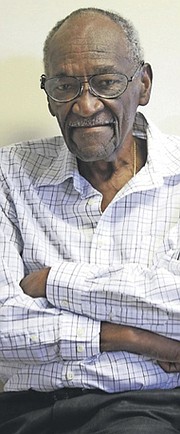Former Assistant Police Comm-issioner Paul Thompson explains why officers must not allow personal political preferences or associations to affect their professional duty . . .
Paul Thompson is the quintessential policeman. His career spanned the modern development of The Bahamas - from colonial times to the challenges of nationhood.
Born in a small farming village in Trinidad, he was recruited by the Royal Bahamas Police Force in 1951. He spent most of his time on the force in the Criminal Investigation Department, retiring in 1981 as an Assistant Commissioner.
He then began a second career as head of security for the Paradise Island Resort & Casino, returning to the police force as a civilian training officer in 1998, and in 2002 was appointed general manager of Wemco Security.
Five years later, he set up his own security company - Paul Thompson & Associates. Now in his 80s, he remains active in security work.
With the approach of a general election, it is important for police officers to re-acquaint themselves with the law governing parliamentary polling.
The ethics of their profession must be uppermost in their minds when tackling problems and dealing with information or complaints. But familiarity with the election laws will enable officers to make decisions with confidence.
At the Police College, officers are taught the value of courtesy, tact, impartiality, truthfulness, sobriety and appearance, among other attributes. A high standard of discipline is required in order to maintain public trust in the police service.
The outstanding reputation of the Royal Bahamas Police Force must be upheld. Officers must be aware that when they receive information about a suspicious activity affecting a parliamentary election, they should apply their training to ensure that disruptions are minimised and those responsible are brought to account.
Investigations must be thorough and miscreants must be dealt with fairly and promptly. Police officers should not attempt to restrict or abuse the democratic rights of citizens. Rather, they are there to protect the freedoms many of us take for granted.
We are all aware, however, that there are some individuals and groups who are capable of attacking the constitutional freedoms that form the basis of our society. Killers, terrorists, manipulators, intimidators, conspirators and their sympathisers - these are the people who purposely initiate violence or engage in fraudulent activity for their own self-interest or the interest of their paymasters.
Our laws are formulated to give police the authority to engage with groups and individuals to protect our fundamental rights and freedoms and prevent the strong or the wicked from taking advantage of the weak and vulnerable.
The police officer differs from the ordinary citizen in that he is professionally trained and provided with the legal authority to engage in searches, seizures and arrests - including the use of force when needed. And the Oath of Office commits the police officer to protect the weak and vulnerable.
Throughout my service in the Criminal Investigation Department (CID) from 1951 to 1976, there was a policy that, when an election approached, special personnel would be selected to deal with contraventions of the Parliamentary Elections Act.
This Act incorporates a large number of offences, including voter registration issues, voting rights issues, candidate nomination issues, bribery, prohibition of liquor sales and ballot box security. Those detectives selected for election duty had to become fully conversant with the laws and regulations governing elections, as well as the rules of evidence and policy policy issues.
The Commissioner of Police would always arrange for a senior officers seminar, with participation from the Parliamentary Registrar’s Office. At these seminars, police officers discuss the importance of elections in a democratic society, the role of the Parliamentary Registry and the contents of the Elections Act, among other matters.
Shortly before the 2012 general election, a Member of Parliament made a statement which resulted in a newspaper headline that the police were to probe opposition political parties. But it was unfair for the MP to say that a special unit had been appointed for the sole purpose of investigating the campaign practices of two specific parties. There is no reason to believe that police personnel would have been assigned to dabble in politics in such a way.
During my career I recall being involved in at least two investigations related to election bribery. One in Abaco led to the arrest and prosecution of United Bahamian Party (UBP) candidate Frank Christie, who was later acquitted by the Supreme Court after a no-case-to-answer plea by his attorney - Eugene Dupuch.
The second involved a complaint made by Progressive Liberal Party candidate Sammy Isaacs against Sir Roland Symonette, the UBP leader. However, we could not come up with any conclusive evidence so the case was dropped.
In more recent elections I am aware of individuals who were arrested holding blank ballots, although I do not recall any actual charges being filed.
I do recall being commended by my superior at CID - Supt Frank Russell - for the performance of our election unit. Apparently, someone had complained to him that we were harassing constituents about bribes. He viewed that as a positive thing.
In the upcoming 2017 general election Bahamian police officers must be vigilant and react immediately to any suspicious activity or information received from poll observers. The general public must do the same. From all accounts, there could be a lot of money involved in this election. It must not be allowed to corrupt the democratic process.
In particular, the police must not allow personal political preferences or associations to affect their professional duty. The reputation of our police force remains untainted. It has been tested before and will be tested in the upcoming general elections. Let us remember with pride those who served with honour.
Comments and responses to insight@tribunemedia.net





Comments
Use the comment form below to begin a discussion about this content.
Sign in to comment
OpenID